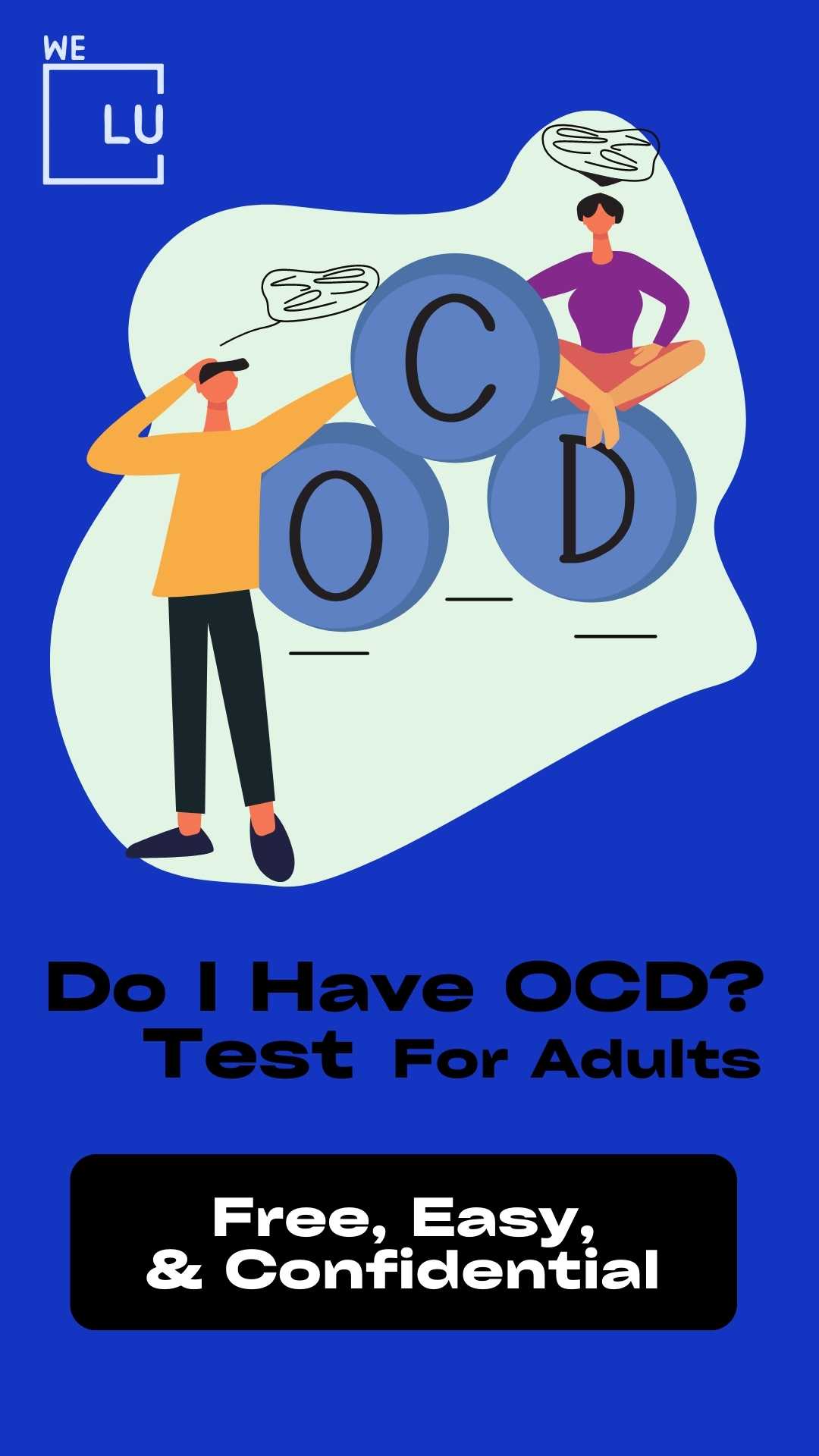OCD Test (Do I Have OCD Quiz?)
Take the below OCD quiz to test if you have OCD symptoms or signs. Make sure to answer the questions thoroughly and honestly. Your responses should reflect how you feel now, not how you’d like to feel. Remember, it is never too late to seek help for OCD or other mental health challenges. Begin with We Level Up’s treatment center network ‘Do I Have OCD Test.’ Obsessive-compulsive disorder (OCD) is a widespread, persistent, and long-lasting mental illness in which a person experiences uncontrollable, recurrent thoughts (also known as “obsessions”) and/or behaviors (also known as “compulsions”) that they feel compelled to repeat.
Some common OCD behavioral symptoms are:
- Fear of dirt or contagion.
- Ambiguity is problematic for you to accept, and you have doubts.
- Requiring symmetry and order in everything.
OCD Quiz For Adults
Do you feel like something isn’t right? Do you feel out of balance and overwhelmed? Take a “Do I Have OCD Quiz” or browse our symptoms list to understand better what’s going on.
With our free online OCD Quiz, you can get a quick indication if you may have OCD or not.
Do I Have OCD Test
Take the OCD test for adults
Welcome to the OCD Symptoms Test or "Do I Have OCD Quiz"! If you've been questioning whether your behaviors and thoughts could be indicative of Obsessive-Compulsive Disorder (OCD), this quiz is designed to offer you some insights. However, it's crucial to understand that this test should not be considered a substitute for professional medical advice or diagnosis.
While this OCD quiz aims to assess common symptoms associated with the disorder, it is important to consult with a qualified healthcare professional for an accurate diagnosis. Remember, this quiz is for informational purposes only and should not be relied upon as a definitive evaluation. Its purpose is to provide preliminary guidance and encourage further discussions with a healthcare provider. Let's begin the quiz and explore whether the symptoms you're experiencing align with those commonly associated with OCD.
*By taking this free quiz, you may obtain your results online and in your email box. You'll have the opportunity to opt-in to learn more about your symptoms, talk to a mental health consultant and join our newsletter. Rest assured your information is private and confidential. Results, consultations and assessment are provided without any cost to you and without any obligation. If you do not wish to provide your contact information, you may omit it during your quiz. Thank you for opting in and participating. To you best of health.
OCD Symptoms Test
Complete the test for OCD and learn about your specific situation. This brief OCD test for adults can help determine if you behave in ways that demonstrate a tendency toward OCD. While helpful, it is not intended to be a comprehensive diagnosis or to diagnose a specific type of OCD. Based on your answers, you may receive a possible indication of OCD. If so, we are here and ready to help. Make sure to consult a healthcare professional for a clinical diagnosis. Call us 24/7 for any questions without any obligation ever.

For an accurate diagnosis and the most suitable course of treatment, you should speak with a skilled healthcare practitioner if you believe you may have OCD or any other mental health disorder.
A mental health illness known as obsessive-compulsive disorder (OCD) is characterized by intrusive, unwelcome thoughts (obsessions) and repetitive, ritualistic activities (compulsions). These sensations frequently result in severe distress and might make it difficult to do regular activities.
Here are a few typical signs of OCD to give you a rough idea:
Obsessions:
- Persistent, bothersome desires, images, or thoughts make you anxious or distressed.
- Fear of germs or pollution.
- Obsessive ideas about hurt or violence.
- Unwanted ideas about morality, sexuality, or religion.
- Excessive attention to symmetry, precision, or order.
Compulsions:
- Repetition of actions, such as repeated washing, cleaning, or inspecting.
- Repeatedly placing things in a certain order or arrangement.
- Counting or repeatedly doing specific verbal or physical actions.
- Requiring repetition of actions or rituals until they are felt to be “just right.”
- Accumulating or hoarding useless goods.
Impact on daily life:
- Focusing on compulsive or obsessive thoughts or behaviors over a prolonged period, frequently longer than one hour daily.
- Being unable to carry out the routines or behaviors, feeling distressed, anxious, or uneasy.
- Finding it challenging to suppress or control one’s compulsions.
The signs of OCD can vary from person to person, and different people may experience different combinations of obsessions and compulsions. I strongly advise consulting a mental health expert for assistance if you believe you might have OCD so they can make a precise diagnosis and recommend the best course of action.
Take An OCD Test For Adults
Adults with Obsessive-Compulsive Disorder (OCD) are often diagnosed using a mix of techniques, such as clinical interviews, symptom assessment instruments, and behavioral observation. Although there isn’t a single test that can be used to diagnose OCD, these evaluations can help determine whether and how severe the disorder’s symptoms are.
OCD Evaluations
OCD evaluations include:
Clinical Interviews: Clinical interviews are conducted by mental health specialists like psychiatrists and psychologists to learn more about a person’s symptoms, past, and general functioning. They inquire specifically about OCD symptoms, such as the kind, frequency, and severity of obsessions and compulsions and how they affect daily living.
Symptom Assessment Scales: To evaluate OCD symptoms, several self-report questionnaires and scales are available. These standardized instruments can gauge the intensity of OCD symptoms and monitor long-term changes.
Behavioral Observation: Mental health practitioners may also examine a person’s behavior to spot OCD-related symptoms. They focus on particular routines, repeating actions, and the discomfort or anxiety brought on when these actions are interrupted.
After completing your OCD test responses. Press submit and await your results. Share your test for OCD results with a professional healthcare counselor. If you need help, call the We Level Up treatment center advocates for a free OCD evaluation and consultation. There’s never any obligation. Your call is free and private.
Get Help. Get Better. Get Your Life Back.
Searching for Accredited Dual Diagnosis Mental Health Centers Near You?
Even if therapy failed previously, or are in the middle of a difficult crisis, we stand ready to support you. Our trusted behavioral health specialists will not give up on you. When you feel ready or just want someone to speak to about counseling alternatives to change your life call us. Even if we cannot assist you, we will lead you to wherever you can get support. There is no obligation. Call our hotline today.
FREE 24/7 Dual Diagnosis Mental Health Services HotlineImportance Of OCD Tests
The diagnosis and management of Obsessive-Compulsive Disorder (OCD) depend significantly on the results of OCD testing and assessments. OCD tests are crucial for the following reasons:
- Accurate Diagnosis: OCD tests assist medical practitioners in determining whether a patient’s symptoms meet the requirements for OCD. To differentiate OCD from other disorders, a thorough assessment is necessary because OCD symptoms can sometimes be confused with those of other mental health conditions. A correct diagnosis guarantees that patients receive the proper care and assistance.
- Severity Assessment: For treatment planning, determining the severity of OCD symptoms is essential. OCD tests that measure the severity, frequency, and discomfort brought on by obsessions and compulsions include the Y-BOCS and OCI-R. Clinicians can use this information to determine the proper care amount and track development.
- OCD Treatment Planning: OCD tests provide valuable information that helps mental health professionals tailor treatment plans to the specific needs of individuals. Assessments aid in identifying the most prominent OCD symptoms, triggers, and related difficulties, which enables the development of targeted therapeutic strategies.
- Monitoring Progress: OCD tests serve as benchmarks for monitoring the effectiveness of treatment interventions. By periodically reevaluating symptoms using standardized scales, healthcare professionals can track changes in symptom severity and the overall impact of treatment. This ongoing assessment ensures that treatment plans can be adjusted if necessary.
- Validation and Self-Awareness: Taking an OCD exam might help those with distressing OCD symptoms feel validated and like their troubles are acknowledged. It can aid people in realizing that their experiences match a known mental health issue. This affirmation helps increase self-awareness, lessen self-blame, and motivate people to get the help they need.
- Research and Understanding: OCD assessments help further understand the condition through study. Researchers can learn more about the prevalence, trends, and effects of OCD symptoms by gathering information from people who have completed these evaluations. This study broadens our understanding of OCD and advances the creation of more effective interventions and therapies.
Remember that OCD tests are only one component of a thorough evaluation by licensed healthcare specialists. They don’t provide a conclusive diagnosis on their own, but when combined with clinical observations and interviews, they significantly contribute to the accurate diagnosis, planning, and management of OCD treatment.

Skip To:
Learn More:
- OCD Signs and Symptoms
- Is OCD An Anxiety Disorder? Here’s The link
- OCD and Depression: What’s The Link?
- PTSD and OCD
- Is Autism a Mental Health Diagnosis? Addiction and Autism, Symptoms, OCD, Depression & Bipolar disorder
- OCD Therapy Benefits, Inpatient Treatment, Medications & When To Seek Help
- Effective OCD Treatment, Dual Diagnosis & Therapies
- What is Inattentive ADHD? Types, Symptoms, & Inattentive ADHD Treatment
- How to Improve Mental Health? 8 Steps for Mental Wellbeing
- 9 Best CBD Gummies For Anxiety Relief
World-class, Accredited, 5-Star Reviewed, Effective Mental Health Dual Diagnosis Programs. Complete Integrated Inpatient Rehab with Free Post Discharge Therapy Planning.
CALL (855) 940-6125End the Emotional Pain Rollercoaster. Gain Stability & Happiness Through Recovery Treatment. Start Mental Health Counseling Today. Get Free No-obligation Guidance by Behaviroal Health Specialists Who Understand Mental Health Recovery.





